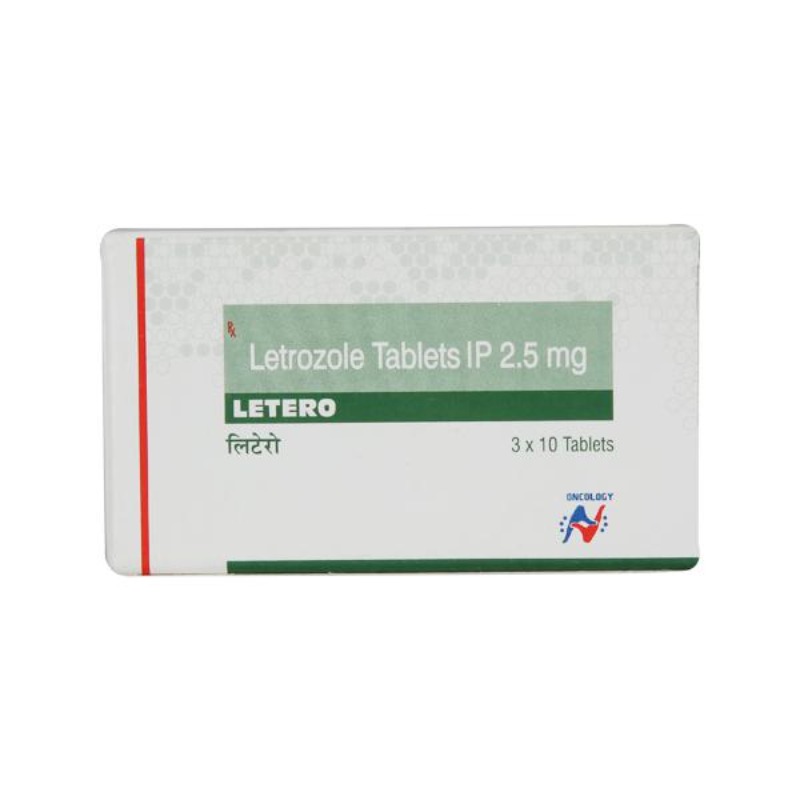DESCRIPTION
Mechanism of Action
• Nonsteroidal, competitive inhibitor of aromatase. Nearly 200-fold
more potent than aminoglutethimide.
• Inhibits synthesis of estrogens by inhibiting the conversion of
adrenal androgens (androstenedione and testosterone) to estrogens
(estrone, estrone sulfate, and estradiol). Serum estradiol levels are
suppressed by 90% within 14 days, and nearly completely suppressed
after 6 weeks of therapy.
• No inhibitory effect on adrenal corticosteroid biosynthesis.
Mechanism of Resistance
• Decreased expression of ER.
• Mutations in the ER leading to decreased binding affinity to
letrozole.
• Overexpression of growth factor receptors, such as EGFR, HER2/
neu, IGF-1R, or TGF-β that counteract the inhibitory effects of
letrozole.
• Presence of ESR1 mutations.
Absorption
Rapidly and completely absorbed after oral administration. Food does not
interfere with oral absorption.
Chemotherapeutic and Biologic Drugs 279
L Distribution
Significant uptake in peripheral tissues and in breast cancer cells.
Minimal binding to plasma proteins.
Metabolism
Metabolism occurs in the liver by the cytochrome P450 system. Process
of glucuronidation leads to inactive metabolites. Parent drug and metabolites
are excreted via the kidneys with over 75%–90% cleared in urine.
Indications
1. First-line treatment of postmenopausal women with hormone-receptor
positive or hormone-receptor unknown locally advanced or metastatic
breast cancer.
2. Second-line treatment of postmenopausal women with advanced
breast cancer after progression on antiestrogen therapy.
3. Adjuvant treatment of postmenopausal women with hormone-receptor
positive early-stage breast cancer.
4. Extended adjuvant treatment of early-stage breast cancer in postmenopausal
women who have received 5 years of adjuvant tamoxifen
therapy.
Dosge Range
1. Metastatic disease: 2.5 mg PO qd until disease progression.
2. Adjuvant setting: 2.5 mg PO qd until disease relapse.
Drug Interaction 1
Phenytoin and other drugs that stimulate the liver microsomal CYP3A4
enzymes, including carbamazepine, rifampin, phenobarbital, and St. John’s
Wort. These drugs may increase the rate of metabolism of letrozole, resulting
in its inactivation.
Drug Interaction 2
Drugs that inhibit the liver microsomal CYP3A4 enzymes, including
ketoconazole, itraconazole, erythromycin, and clarithromycin. These drugs
may decrease the rate of metabolism of letrozole, resulting in increased drug
levels and potentially increased toxicity.
Drug Interaction 3
Warfarin—Patients receiving coumarin-derived anticoagulants should be
closely monitored for alterations in their clotting parameters (PT and INR)
and/or bleeding, as letrozole may inhibit the metabolism of warfarin by the
liver P450 system. The dose of warfarin may require careful adjustment in
the presence of letrozole therapy.
Drug Interaction 4
Clopidogrel (Plavix)—Letrozole therapy may reduce the clinical efficacy of
clopidrogel, as it is an inhibitor of CYP2C19, which is required for activation
of clopidrogel.
Special Considerations
1. Letrozole is indicated only for postmenopausal women. Efficacy in
premenopausal women has not been established, and there may be
an increased risk of benign ovarian tumors and cystic ovarian disease
in this population.
2. Use with caution in patients with abnormal liver function. Monitor
liver function at baseline and periodically during therapy. The dose
should be reduced by 50% in patients with cirrhosis and severe
hepatic dysfunction. In this setting, the recommended dose is 2.5 mg
PO every other day.
3. No need for glucocorticoid and/or mineralocorticoid replacement.
4. Closely monitor women with osteoporosis or at risk of osteoporosis
by performing bone densitometry at the start of therapy and at
regular intervals. Treatment or prophylaxis for osteoporosis should
be initiated when appropriate.
5. Letrozole can be taken with or without food.
6. Pregnancy category D. Breastfeeding should be avoided.
Toxicity 1
Mild musculoskeletal pains and arthralgias are the most common adverse
events.
Toxicity 2
Headache and fatigue.
Toxicity 3
Mild nausea with less frequent vomiting and anorexia. Thromboembolic
events are rare, and less common than with megestrol acetate.
Toxicity 4
Hot flashes occur in less than 10% of patients.
Toxicity 5
Mild elevation in serum transaminases and serum bilirubin. Most often
seen in patients with established metastatic disease in the liver.
Toxicity 6
Thromboembolic events are rarely observed.
SPECIFICATION


Login To Comment